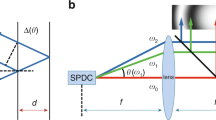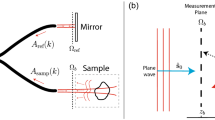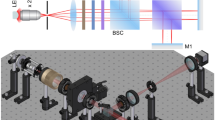Abstract
1. The Phenomenon.—No doubt the following phenomenon has been noticed before, but I have seen no description of it. If a vertical sheet of white light L from a collimator is reflected from the two faces of a plateglass grating, having about 10,000 or more lines to the inch, g being the ruled face, the two beams b and y going to the opaque mirror N are respectively vividly blue and brownish-yellow. In other words, more blue light is regularly reflected from the ruled surface than is transmitted, and more reddish light transmitted than is reflected. Singe the plate grating is not quite plane parallel, two of the four rays, b1 and y1, are seen in the same colours in the telescope. This is a great convenience in adjusting the displacement interferometer, where the spectra from b alone are wanted, and the y ray may be screened off at N, while the other y1 has no spectrum.
This is a preview of subscription content, access via your institution
Access options
Subscribe to this journal
Receive 51 print issues and online access
$199.00 per year
only $3.90 per issue
Buy this article
- Purchase on Springer Link
- Instant access to full article PDF
Prices may be subject to local taxes which are calculated during checkout
Similar content being viewed by others
Author information
Authors and Affiliations
Rights and permissions
About this article
Cite this article
BARUS, C. Scattering in the Case of Regular Reflection from a Transparent Grating: an Analogy to the Reflection of X-Rays from Crystals. Nature 92, 451–452 (1913). https://doi.org/10.1038/092451a0
Issue Date:
DOI: https://doi.org/10.1038/092451a0
Comments
By submitting a comment you agree to abide by our Terms and Community Guidelines. If you find something abusive or that does not comply with our terms or guidelines please flag it as inappropriate.



